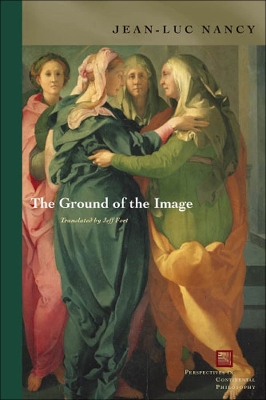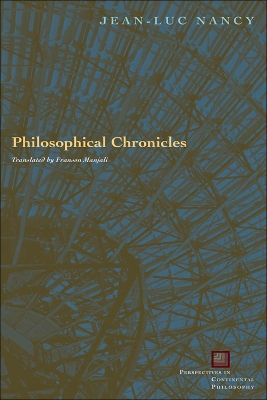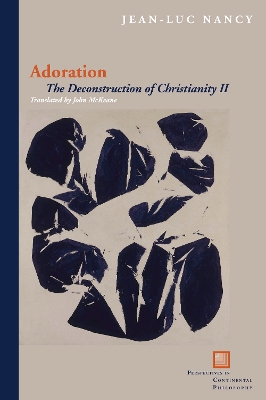Perspectives in Continental Philosophy
4 total works
If anything marks the image, it is a deep ambivalence. Denounced as superficial, illusory, and groundless, images are at the same time attributed with exorbitant power and assigned a privileged relation to truth. Mistrusted by philosophy, forbidden and embraced by religions, manipulated as “spectacle” and proliferated in the media, images never cease to present their multiple aspects, their paradoxes, their flat but receding spaces.
What is this power that lies in the depths and recesses of an image—which is always only an impenetrable surface? What secrets are concealed in the ground or in the figures of an image—which never does anything but show just exactly what it is and nothing else? How does the immanence of images open onto their unimaginable others, their imageless origin?
In this collection of writings on images and visual art, Jean-Luc Nancy explores such questions through an extraordinary range of references. From Renaissance painting and landscape to photography and video, from the image of Roman death masks to the language of silent film, from Cleopatra to Kant and Heidegger, Nancy pursues a reflection on visuality that goes far beyond the many disciplines with which it intersects. He offers insights into the religious, cultural, political, art historical, and philosophical aspects of the visual relation, treating such vexed problems as the connection between image and violence, the sacred status of images, and, in a profound and important essay, the forbidden representation of the Shoah. In the background of all these investigations lies a preoccupation with finitude, the unsettling forces envisaged by the images that confront us, the limits that bind us to them, the death that stares back at us from their frozen traits and distant intimacies.
In these vibrant and complex essays, a central figure in European philosophy continues to work through some of the most important questions of our time.
In eleven brief, engaging talks originally broadcast on French public radio, Jean-Luc Nancy offers a philosopher’s rough and ready account of some of the pressing questions of our day and addresses chronic issues within philosophical inquiry. The fundamental question, which recurs again and again, is whether philosophy is conditioned by the world the philosopher inhabits, or whether it must remain unconditioned by that world.
Nancy discusses: terror in relation to religion and capitalism; the relevance of philosophy to life (whether philosophy can be a form of life); the status of god in monotheism; the relevance of “politics” as it is defined today; the “Heidegger affair” and its consequences for philosophy; war, especially in the context of the invasion of Iraq; the role of negativity in philosophical and cultural discourses; “art” and the variability of its meanings; the predominance of the metaphor of the sun. The essays can be read separately, but together they amount to the striking vision of a philosopher sensitive to the world of his times and attempting to open his own path within it.
This second volume in Nancy’s The Deconstruction of Christianity explores the stance or bearing that would be appropriate for us now, in the wake of the dis-enclosure of religion and the retreat of God: that of adoration.
Adoration is stretched out toward things, but without phenomenological intention. In our present historical time, we have come to see relation itself as the divine. The address and exclamation--the salut!--that constitutes adoration celebrates this relation: both the relation among all beings that the world is and what is beyond relation, the outside of the world that opens us in the midst of the world.
A major contribution to the contemporary philosophy of religion, Adoration clarifies and builds upon not only Dis-Enclosure, the first volume in this project, but also Nancy’s other previous writings on sense, the world, and the singular plurality of being.
How have we thought "the body"? How can we think it anew? The body of mortal creatures, the body politic, the body of letters and of laws, the "mystical body of Christ"-all these (and others) are incorporated in the word Corpus, the title and topic of Jean-Luc Nancy's masterwork.
Corpus is a work of literary force at once phenomenological, sociological, theological, and philosophical in its multiple orientations and approaches. In thirty-six brief sections, Nancy offers us at once an encyclopedia and a polemical program-reviewing classical takes on the "corpus" from Plato, Aristotle, and Saint Paul to Descartes, Hegel, Husserl, and Freud, while demonstrating that the mutations (technological, biological, and political) of our own culture have given rise to the need for a new understanding of the body. He not only tells the story of this cultural change but also explores the promise and responsibilities that such a new understanding entails.
The long-awaited English translation is a bold, bravura rendering. To the title essay are added five closely related recent pieces-including a commentary by Antonia Birnbaum-dedicated in large part to the legacy of the "mind-body problem" formulated by Descartes and the challenge it poses to rethinking the ancient problems of the corpus. The last and most poignant of these essays is "The Intruder," Nancy's philosophical meditation on his heart transplant. The book also serves as the opening move in Nancy's larger project called "The deconstruction of Christianity."



